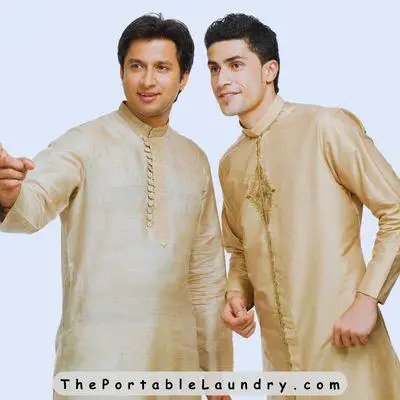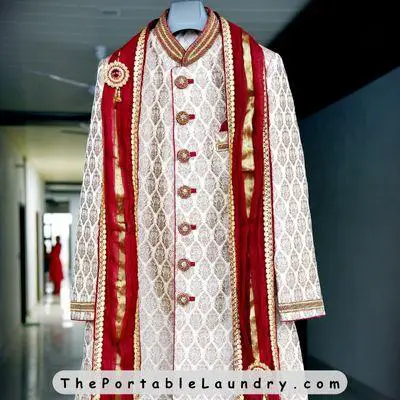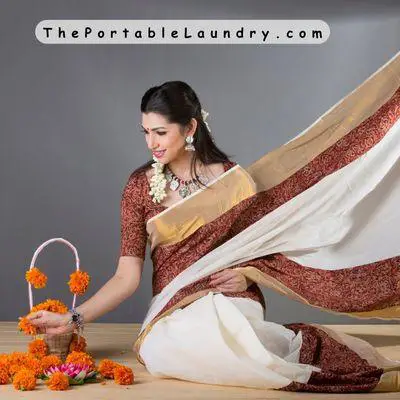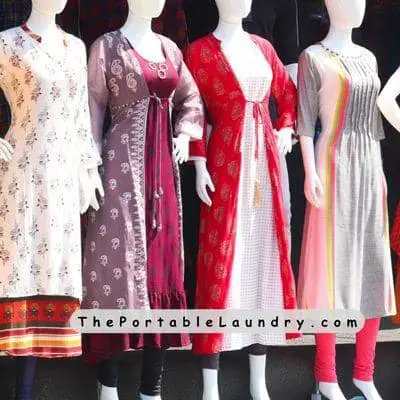Tulsi Vivah is typically celebrated after the end of the monsoon season in India.
It’s a popular festival celebrated by the Hindu religion and is also an indication of the arrival of the wedding season.
It is also known as Tulsi Kalyanam which is a symbolic wedding between the Tulsi plant and Shaligram.
Note: Tulsi refers to the holy basil (plant) and Shaligram is an Amla branch.
People shop around for the best outfit to celebrate this auspicious occasion.
In this article, we will not only discuss the types of traditional wear people prefer for Tulsi Vivah but also some useful tips for laundering them with care.
Traditional wear for Men (Fabric Materials with laundry tips)
Kurta Pajama

Kurta is a top wear like a long traditional shirt for men and Pajama is the bottom wear or pants.
The materials used to make Kurtas and Pajamas are typically made from soft textiles since they are intended to be comfortable to wear and are amongst the loose-fitting outfits.
Most of these outfits are made from pure cotton or blended with satin and silk.
These outfits are available in various colors, sizes, and patterns to choose from and can be a good fit for auspicious occasions like tulsi vivah.
Laundry Tips For Kurta (Caring after you have used it a couple of times)
- You should launder these ethnic wear outfits on delicate settings if you prefer using your washing machine.
- Make sure to look at the care label before washing to check for any special instructions.
Sherwani

Sherwani is a long-sleeved outer coat typically worn by men in India, especially during festivals, weddings, and other cultural events.
You can find Sherwanis from plain to heavily designed styles and patterns and accordingly, their cost varies.
Since sherwanis are very popular, it can be a good tool for anyone who likes to be a center of attraction.
It’s a good fit for occasions like Diwali, wedding, tulsi vivah, etc.
Sherwani Laundry and caring tips
- The most preferred way to clean Sherwani is dry cleaning in most cases.
- You can either take them to the nearest dry cleaners or buy dry cleaning kits and do it yourself.
- To store Sherwani you should use the cover that comes along with the set. Place them in their respective covers and hang them in your wardrobe.
Note: Do not fold and pack your sherwani in an uneven manner or else they will lose their shape and may become difficult to retain going forward.
Formals

Formal wear such as designer Shirts with plain or pattern pants is another popular trend when it comes to festival wear in India.
They are typically made from a variety of materials and need to be laundered accordingly.
You can wear them several times and on different occasions (including tulsi vivah).
Laundering tips post wearing formals:
- Always read the care label before washing them in your machine, if you are unsure about it simply prefer washing them by hand.
- Post washing you can let them air dry naturally and depending on the fabric material you can iron them using low heat settings before storing them away.
Traditional wear for Women (Fabric Materials with laundry tips):
Saree

The most preferred material by Indian women is Silk fabric when it comes to choosing a saree as a traditional wear (especially for an occasion like Tulsi-vivah).
Silk sarees are favored during festivals for their luxurious texture, vibrant colors, and intricate designs that add a touch of elegance and tradition to celebrations.
The sheen of silk enhances the festive atmosphere, making it a popular choice among women.
Additionally, silk symbolizes grace and cultural richness, making it a preferred attire for special occasions and traditional festivities.
Laundering tips post wearing silk saree in an occasion like tulsi-vivah:
- You should avoid washing silk sarees in washing machines in most cases and prefer washing them by hand.
- Additionally do not use chemical solutions or bleaching agents while treating silk fabrics.
- It is also not recommended to iron silk fabrics, this is because the slightest heat if transferred to silk can lead to shrink its fibers in no time. Instead, use steam irons to get rid of wrinkles from silk fabrics.
Note: To store silk sarees you should first pack them in a muslin cloth to avoid kinks in the fabric.
Lehenga

The lehenga is a form of ankle-length skirt and is the most preferred traditional wear for women in India
Lehengas can be found available in different patterns and styles of traditional embroideries.
Similar to Sherwanis, Lehengas include the delicate and intricate design on the fabric, hence these delicate and attractive garments aren’t suitable for machine washing or by hand in most cases.
Washing Tips:
- You should get them treated by dry cleaning experts to avoid causing any damage to the expensive material.
- When it comes to storing Lehengas, do not fold them in an uneven manner, and always place them in a well-ventilated bag or simply a mesh bag.
Dress Suit

Dress Suits are the most common traditional wear for women similar to Kurtas and Pajamas for men.
The materials used to make Dress suits are also similar to Kurtas and Pajamas in most cases.
These suits make an excellent fit for an occasion like tulsi vivah because its not only comfortable but also requires minimal effort in maintaining them (Unlike saree which requires regular adjustments)
Laundering tips:
- Be very careful while washing these outfits as they can bleed colors, hence you should wet an inconspicuous area and rub it with a cotton swab to ensure there aren’t any signs of dye transfer.
- Dress suits made of cotton can be ironed on low to medium settings, however, it is always best to refer to the care label of the fabric.
Final Thoughts
There are plenty of dress codes for Tulsi Vivah for both men and women to consider. However, it is equally important to carefully launder them so that they last longer.
To Machine wash Kurtas Pajamas and Dress suits make sure they aren’t color-bleeding fabrics.
Also, you should place neem leaves, naphthalene balls, etc. when storing your ethnic wear to prevent pests and the growth of molds.
Lastly, it’s always a good idea to dry clean your expensive and delicate ethnic attires such as sarees, lehengas, sherwanis, etc. from the expert Dry Cleaners as self cleaning may do more harm.

